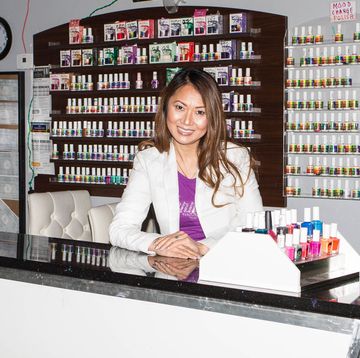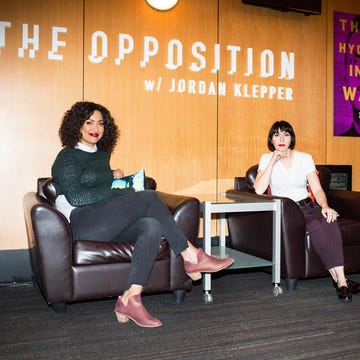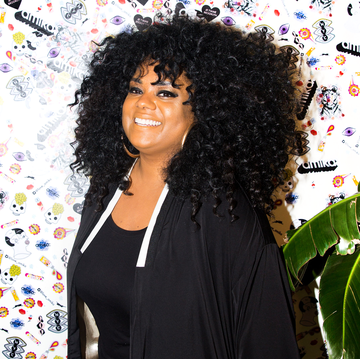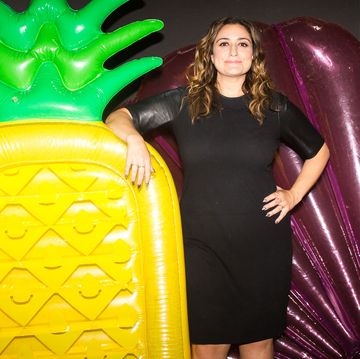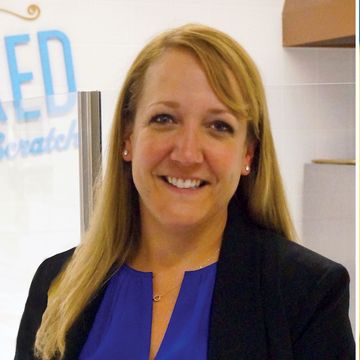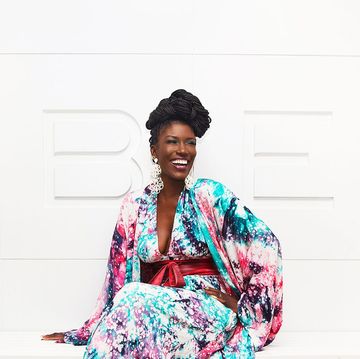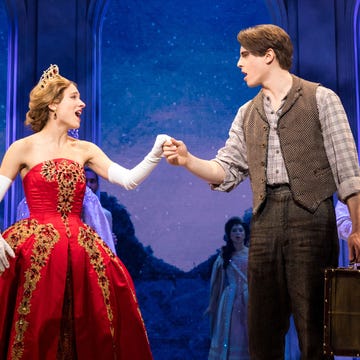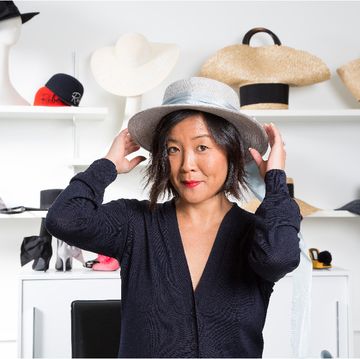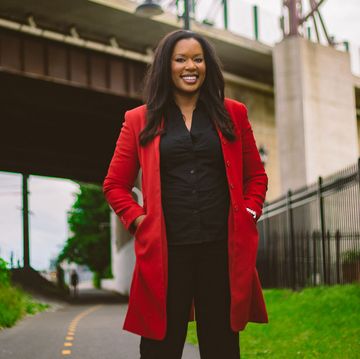Victoria Garcia turned her love of problem solving into a career as a NASA engineer. Landing a job in one of the government's most elite organizations is no easy feat. Competition is fierce, job requirements are demanding, and expectations are high. That's stressful for anyone, and Garcia has done it all as a deaf person.
Now 32, Garcia works for the Marshall Space Flight Center in Huntsville, Alabama. In her job, she helps coordinate all the logistics and safety components of the spacecraft we only see in photographs and video. Over a series of email interviews, Garcia shared her story of finding the job of her dreams.
Growing up in Miami, I wanted to be a veterinarian, not an astronaut. Both of my parents work in the finance industry, so they weren't exactly experts in engineering or the space industry. I believe the biggest reason why I ended up becoming an engineer is because of my love for problem solving and figuring out how to achieve a goal. This love was always there. I would take different sets of Legos and combine the pieces to create something new. I spent hours playing video games trying to figure out how to beat the game.
When my parents divorced when I was 11, I started fixing things around the house. I lived with my mom, and she is a very intelligent woman but definitely not mechanically inclined. I took opportunities to fix things, such as installing new phones or electronics. I became bolder as I got older, replacing a ceiling fan and taking apart two flat-screen TVs to replace the power supply units.
I was born profoundly deaf. I cannot talk on the phone or understand someone without lip-reading them. Even with lip-reading, sometimes I cannot even understand some people. I knew that I would not be able to do anything that required listening over the phone or radio, like being a commercial pilot. When I was in high school, I focused on careers that didn't require a lot of listening, like computer science.
I entered college at Rensselaer Polytechnic Institute with a computer science major but decided on mechanical engineering since I liked to work with my hands.
I had two internships that helped shape my career. The first was with Benét Laboratories, a research and development company known for manufacturing cannons and mortars, located in Watervliet, New York. The most memorable projects I worked on involved testing the safety and efficacy of the cannons the company manufactured.
Nearing graduation, I still didn't think about working for NASA because, honestly, I thought it was beyond my capabilities. However, I saw an opportunity for Entry Point, an internship program for people with disabilities studying science-, technology-, engineering-, and mathematics-related fields. I was a bit uncomfortable applying for this program because I didn't want someone to hire me just because I was deaf.
But interviewing was hard. At this time, around 2005, I used the relay service to conduct phone calls. I would message the relay service (either by instant message over the Internet or on the TTY phones), giving them the number of the person I wanted to call. The relay operator acts as a translator by typing everything that is said to me and by saying out loud everything I type. When I was reaching out for job opportunities, I would call an employer (via relay operator) to explain that I am deaf and need to set up a time for an interview using the relay service. They never called me back. After that, I felt better about applying for Entry Point, because the companies already know that I am deaf, and I don't have to go through that awkward explanation of my disability and also feel disappointed when they don't call me back. Entry Point connected me with NASA, which hired me as an intern with the Boeing Fluids Group at Kennedy Space Center.
My internship with Kennedy Space Center was amazing in the sense that I was right in the middle of the action. My job was to help test the water and ammonia lines for modules that were planned to be part of the International Space Station. I was able to go inside the components of the International Space Station before they were launched. I was able to watch my first shuttle launch from just three miles away (most people don't get closer than six miles) and feel the vibrations of the launch. It remains one of the most amazing experiences of my life. Being so close to the action of the space shuttle definitely inspired me to pursue a career at NASA.
Before I graduated from RPI, I wanted to make sure that I had a backup plan. I wanted to start working right away after graduation, but due to the lack of job offers, I decided to get my master's degree in mechanical engineering at Georgia Tech.
I started applying for jobs when I was almost done with my master's thesis, and the human resources/disability office at Marshall Space Flight Center contacted me and set up an interview at a career fair in Atlanta. The people who interviewed me forwarded my résumé to several different managers. The best part about the interviews was that there were no awkward explanations, and all managers fully understood the situation with my hearing and had no problems doing an email interview.
I was hired at Marshall as a system engineer in 2008. The simplest way to explain system engineering is to analyze the product from an overall perspective. When there is a huge product, such as a launch vehicle, you have thousands of people working on different aspects of the product. There is a group of people working on electronics, another one on the structural design, another on the propulsion, and so on. One of the basic tasks of a system engineer is to make sure all of those groups are in sync. So a system engineer may do some analysis and/or collaboration to help every group meet its goals.
One of the best things about working for NASA is that there always seems to be an opportunity to work on something different. Usually, I work on a project, complete it, and then have a completely new job on a different project.
Another thing I enjoy about working for NASA is that working in the space industry taps into my love for problem solving. Going into space is, without a doubt, difficult. We deal with a lot of unknowns. We try to make sure we account for any possible future issues to focus on safety, so we have to ask a lot of "what ifs." Engineers tend to have an inquisitive mind, so we ask the tough questions that have no obvious answer. Problem-solving skills are required to figure out what needs to be done. It could be a kind of analysis, testing, redesigning, or even just slightly changing the mission.
I've worked at Marshall for a little over six years now, and I can see myself working for NASA for a long time. I would like to eventually lead team projects. When you work for the government, promotions mean more responsibility and more money, but my job title remains system engineer.
The most challenging thing about my job is dealing with meetings, especially teleconferences. It is difficult for me to handle large talking groups. I can only lip-read one person at a time, and that can be difficult when people interrupt each other. I used to just skip teleconference meetings, but it was getting tiring and frustrating to not know what was going on. So I asked to use relay conference captioning and that has helped a lot. For regular meetings, I now have much more courage to speak up. If there are new people, I tell them upfront to make sure that only one person speaks at a time and I ask them to face in my general direction so I can understand them. Coincidentally, this makes people be more concise when they speak instead of just talking away and interrupting each other. If I am presenting to a very large group, I ask them to raise their hands if they have questions because I won't be able to hear them ask me the question while I am presenting. They probably feel like they are back in school raising their hand, but people at NASA have been happy to accommodate me for whatever I need.
I wouldn't say that I have a unique strength because of my disability, but rather a unique perspective on life, which can make me a stronger person. Also, because of my deafness, I have to prove myself quite a bit, and this can help me in other ways. For example, whenever I present something at work or school, I am extra diligent about thinking of all the possible questions or issues that people may bring up. The reasons are twofold: I don't want to give them any indicator that I don't know what I am doing, and I am much more likely to understand someone if I am expecting what they may say.
It does seem unfair that I have to work harder and deal with more issues than a person who does not have a disability just to get the same opportunity. However, I do think it is worth it. For every person who has a disability who enters in the competitive career field, it becomes more ordinary and comfortable to have disability workarounds in the work environment, causing fewer obstacles for people with disabilities to join the workforce. I'd say to any young person with a disability now entering the workforce: Don't be defeated by those obstacles; find a way around them.
Get That Life is a weekly series that reveals how successful, talented, creative women got to where they are now. Check back each Monday for the latest interview.
Follow Heather on Twitter.
Photo credit: Rae Marshall Photography


